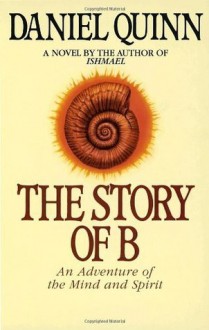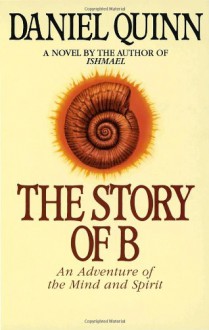 The Story of B
The Story of B is the second of Daniel Quinn's
Ishmael trilogy. These books are a trilogy not so much in that they are the continuation of a story, but in that they are a continuation of a single teaching that each book elucidates with its own slant. The only common fictional element is the character, Ishmael, who is hardly more than referenced in
The Story of B, but that reference lends its verification to Mr. Quinn's core teaching and lets you know that this book has its place among the three (
Ishmael, The Story of B, My Ishmael--I suggest you read the books in that order). That teaching is the value of these books.
That teaching is the (in my opinion) brilliant, startling, enlightening, and intellectually (and even spiritually) satisfying proposition that the problems of our current civilization stem from a single human culture that has spread and dominated the world since the Agricultural Revolution (a specific type of agriculture) occurred some 10,000 years ago. Mr. Quinn refers to this agriculture as "totalitarian agriculture" in
The Story of B because it is based on the hallmark premise of that culture that their way is the only "right" way to live and that all opposition must be utterly destroyed. The rise of this culture (called "The Takers" by Mr. Quinn) is mythically described in the Genesis stories of Adam and Eve's Fall and in the Slaying of Abel by Cain.
Mr. Quinn says the problem with this Taker culture, especially in our time, is that it...
...isn't working--doesn't work and can't work. It bears with it its own seeds of destruction. It's fundamentally unstable.Mr. Quinn expresses this teaching through fiction in all three books, and most engagingly in the Ishmael books. In all of the books, the point of view is that of a student seeking the knowledge offered by a sage who wants to oppose the evils of the Taker culture by changing the minds of his students. This fictional premise works well in the Ishmael books, largely due to the interesting and compelling character of Ishmael, who is an intelligent gorilla. In
The Story of B, the teacher is actually the head of a group of "coffee house intellectuals" and is referred to as "B." The implication is that this head teacher changes over time and the one that the student protagonist in
The Story of B deals with is called Charles Atterly.
The "student" in
The Story of B is Jared Osborne, a Roman Catholic priest. He is sent by his superior, Father Lulfre, to Germany to investigate the teachings of Atterly that have had enough impact as to come to the attention of the Church. Lulfre also wants Osborne to gather information to help determine whether Atterly may be the Antichrist, because finding the Antichrist is a prime mission of Lulfre's order, the Laurentians. So the "story" in
The Story of B is Osborne's working of this mission. In the course of it, he becomes caught up in B's teachings and duly records them. I expect you can guess the rest.
The story is well-told, Mr. Quinn is a good writer, and it held my interest throughout. I liked the idea of the coffee house group and of its changing "leadership." Some insights are offered about the thinking and humanness of a Catholic priest that make Osborne a sympathetic character, but still I have some criticisms.
Osborne starts out as a well educated and committed priest. Indeed, of the three books, he is (or should be) the most intellectually capable of all the students presented. As such, he should have had more to offer in his discourses with B, especially more initial opposition. And that opposition should have been based more on his priesthood training. There are moments when he does this, but they are brief and cut off too soon. Consequently, he comes off as being
too accepting of B's teachings and
too readily a convert. In contrast, the students in the Ishmael books come upon their teacher's insights in a more believable fashion, making it easier for the reader to share in their intellectual discovery.
Also, while I am not familiar with the Catholic order of the Laurentians, I wonder if they are as ruthless as presented in
The Story of B. They come off as a bit mafia-like. While that's obviously for the sake of the drama, it's a bit of a stretch, like Osborne's quick acceptance of B's teachings. It might also come from Mr. Quinn's apparent disdain for the spiritual, or anything he considers "nonscientific."
The Story of B is an expansion and clarification on the teaching offered in
Ishmael. It's not a big expansion--it doesn't break much new ground--but it does offer the basic premise in a way that may be more straightforward than it was in
Ishmael. Mr. Quinn does this in the very structure of the book. The first part is the telling of the story of Jared Osborne and his search for, and engagement with, B. In this part, he doesn't give the actual words of B in his lectures, but just Osborne's reaction to them. Enough is given to provide the reader with the basic idea's of B's teachings, but the actual lectures are saved for an afterword labeled, "The Public Teachings." This works and facilitates the book's use as a reference.
The Story of B is part of a trilogy of Mr. Quinn's books that I consider essential reading for anyone seeking to understand why the world is the way it is. For the open-minded, critical reader, these books have a tremendous insight to offer. That's why so many reviews refer to them as "life changing." While
The Story of B has some dramatic shortcomings, it is still an enjoyable read and one of my favorite books.


 Log in with Facebook
Log in with Facebook 








